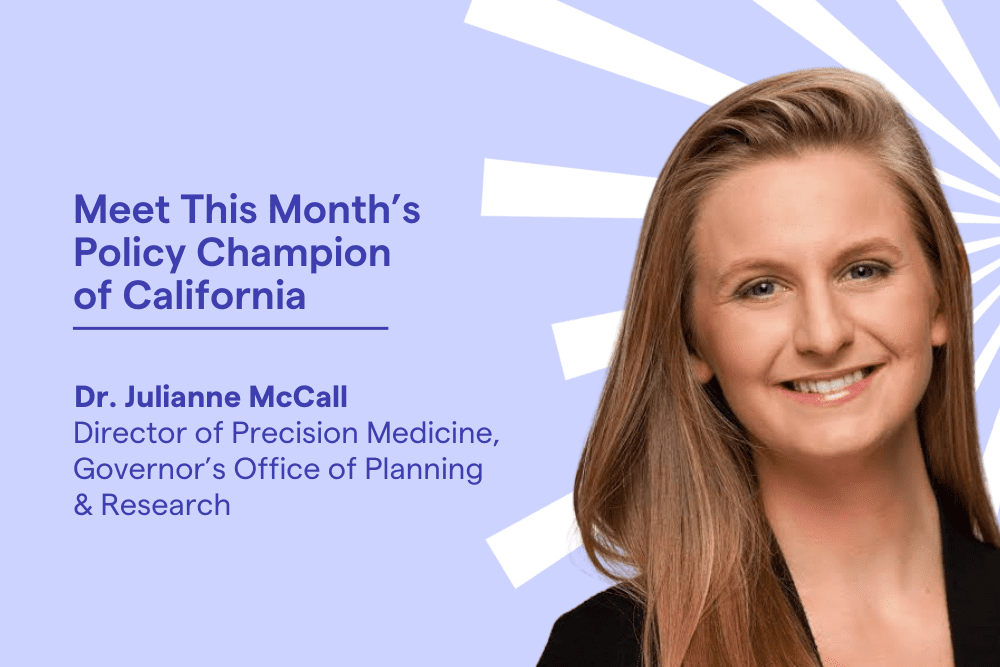March 20, 2024
Policy Champion – Dr. Julianne McCall, Director of Precision Medicine, Governor’s Office of Planning & Research

Dr. Julianne McCall is the director of precision medicine in Governor Gavin Newsom’s Office of Planning & Research. In 2023, she spearheaded California’s response to the Biden Administration’s Advanced Research Projects Agency for Health (ARPA-H) call to develop a nationwide health innovation network, entailing convening and coordinating key stakeholders including recruiting Biocom California as the industry convener and liaison to Congress.
Dr. McCall tirelessly took on this challenge alongside key partners and within one month developed and led a 180-member cross-sector consortium spanning all fifty states plus U.S. territories, bringing together leaders across business, academia, communities, nonprofits, healthcare, and government committed to re-envisioning research partnerships and advancing equitable health solutions. Because of her exemplary work, California is better connected within and beyond state borders to leverage the nation’s diverse community of R&D innovators.
You were part of the team that brought together a very large and diverse group of stakeholders in a compressed period of time. What were some of the obstacles you encountered?
The Newsom Administration was supportive from day one toward responding to ARPA-H’s challenge to develop a new nationwide health innovation network. As a scientist, it was a dream come true to see the new agency put forward an ambitious vision that centered real patients and diverse communities. With only a few weeks to manifest such a network, time was the primary obstacle.
What were some resources or people that the State worked with on the proposal?
A number of early and influential team members found one another after the ARPA-H Founder’s Day launch, particularly from the UC Office of the President, Consortium Management Group, Biocom California, Plug & Play, and McKinsey. The core team continued to build a roster of essential advisors and members from UCSF, UCSD and the San Diego Supercomputer Center, UC Berkeley, A16Z, and many other world-class organizations. With such a strong and committed foundation, we were able to leverage our networks to engage key orchestrators of life science communities across the nation, assembling a network of networks and coordinating a governance structure that honored local adaptations and representation. The effort was entirely powered by team members’ heroic generosity of time and round-the-clock dedication to connecting across all fifty states plus territories over mutual scientific interests, complementary expertise, and a passion for accelerating equitable progress.
What is it about the life science industry that makes you want to support it?
As wondrous as our science and technology capabilities are already, the status quo is still failing too many communities. The research-to-action pipeline is incomplete without deeply informed private sector leaders translating scientific insights into products and services that do the work of changing lives. What inspires me is the creativity, perseverance, and drive of those at the cutting edge in the life sciences industry, working with conviction toward a better society.
What is it about California that makes it a good place for life science to grow and thrive?
We’re fortunate in California to benefit from a culture that welcomes ideas, embraces entrepreneurialism, and recognizes the value of diverse perspectives. The late Justice Brandeis coined, “States are the laboratories of democracy.” In the Governor’s Office of Planning & Research, I love applying the concept to our state’s role in experimenting with how innovation can better serve communities, akin to a laboratory of research policy.
What other policy opportunities are there that the state could pursue to help life science thrive?
It’s a big deal for a state to invest in research, a role predominantly ascribed to federal agencies. We are deliberate about avoiding duplication with existing efforts, rather seeking to demonstrate innovative approaches or focus on understudied, emerging topics in a more nimble and local manner. For industry leaders who are eager to contribute, the State is equipped to serve as a convener to drive conversations around collaborative potential, cross-sector partnership and efficiency, industry standards, and priority knowledge gaps which are potent contributors to disparities.
How can the industry or Biocom California help the Office of Precision Medicine thrive?
We want your ideas! Connect with my office and the Governor’s Office of Business and Economic Development to help us better understand the universe of opportunities, including how the ecosystem can improve and how government may be able to support more equitable progress.
View all Policy Champions.